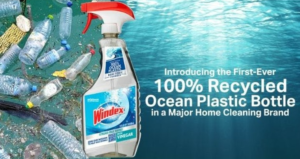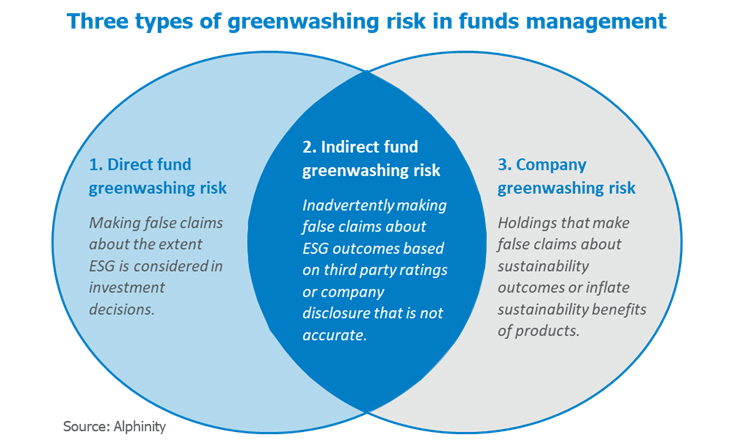The term “greenwashing” was coined by environmentalist Jay Westerveld in 1986 when he claimed that the hotel industry was falsely promoting the reuse of towels as part of an environmental strategy, when in fact the initiative was designed as a cost-saving measure[1]. The term officially entered our vocabulary in 1999 when it was added to the Oxford English Dictionary. In 2011, the first Australian Guideline on greenwashing titled ‘Green marketing and the Australian Consumer Law’ was published under the Competition and Consumer Act 2010.
In a recent guidance note published by the Australian Securities and Investments Commission (ASIC), greenwashing is defined for investors as “the practice of misrepresenting the extent to which a financial product or investment strategy is environmentally friendly, sustainable or ethical”. In general terms, greenwashing is essentially the practice of providing misleading information, or making misleading statements, about the ‘sustainability credentials’ or ‘greenness’ of a product or service.
How Alphinity avoids accusations of greenwashing
1. Clearly define “sustainability”:
We clearly define sustainability for our two Sustainable Funds in their respective Charters. These Funds aim to invest in companies that have the capacity to make a net positive impact on society in areas of economic, environmental and social development by contributing towards the advancement of one or more of the United Nations’ Sustainable Development Goals (SDGs).
2. Internal assessment of ESG:
We do our own work to assess companies’ ESG performance. This includes detailed reviews of ESG disclosures and active engagement with companies to understand ESG components better. We also track ESG integration activities to demonstrate consistent applications of policies.
3. Shared responsibility:
Integrating ESG considerations into investment decision making is ultimately the responsibility of the investment team. The ESG team supports the investment team in its decision-making through process management, research, and internal reporting.
4. We do not make any claims around ‘impact’:
As equity investors, we are just one of many stakeholders who seek to influence companies in all sorts of ways, in our case towards more sustainable practices.
5. Engage with investee companies:
We engage with investee companies on statements, claims or reporting they make that could be at risk of greenwashing accusations. This commonly includes broad net zero statements or claims. We are unlikely to remain a shareholder of a company which makes unsubstantiated claims.
6. Reporting:
We publish an annual ESG and Sustainability Report and disclose our proxy reporting activities and fund holdings on our website. We also report regularly to our clients on all aspects of ESG integration and sustainability.
Consumer choices and environmental labelling
In the past decade, as more consumers are making choices based on the environmental credentials of products, companies are increasingly making green claims about their products. In a study of more than 10,000 people globally, 68% of global consumers have made modest to significant changes to their consumption behaviours over time in an effort to live more sustainably. Notably, 34% say they are willing to pay more for improved sustainability qualities of products or services[2].
Of course, there is fine line between promoting the environmental or sustainability benefits of products and services to secure further clients or customers, and not overselling those benefits and therefore making claims that would mislead the customer.
In 2021, the International Consumer Protection and Enforcement Network (ICPEN), a global network of consumer protection authorities from more than 65 countries, investigated almost 500 websites making product sustainability claims. It found that in 40% of cases there was a risk of consumers being misled. In the UK, the Competition and Market Authority (CMA) watchdog says more than half of consumers take these claims into account when making purchasing decisions[3].
Even the act of using the colour green (like these two examples below) in labels can be considered misleading unless the ‘greenness’ can be shown to be a reasonable claim to the consumer. Just recently, a class action has been raised against global apparel retailer H&M claiming that the “conscious choice” labelling is incorrect and misleading to the consumer.


Legal and regulatory action on greenwashing
Since 2019 there have been at least 30 individual legal cases globally related to greenwashing, and countless other regulatory actions that have stopped companies participating in greenwash behaviours through advertisements or general marketing. Some examples are below:
 |
Windex misleading plastic packaging claims (2019-2020)
The glass cleaner by SC Johnson claimed its bottles were made from 100% “ocean plastic”. In fact, the plastic used to make the bottles was never in the ocean. It was pulled from plastic banks in Indonesia, the Philippines, and Haiti. |
 |
Ryanair low carbon flying false claims
In 2020, advertisements for Ryanair claiming the airline had the “lowest emissions of any major airline” were banned by the UK advertising regulator. They were banned on the basis that the airline had inadequate evidence to support the claims. |
 |
DWS Group regulatory investigation: Whistleblower claims about ESG in investment practice
In September 2021, it was revealed that the US Securities and Exchange Commission, US federal prosecutors, and the German financial supervisory authority BaFin were investigating the asset manager arm of Deutsche Bank for allegedly misleading investors on the way it uses ESG and sustainability criteria across its €1 trillion fund products. DWS has issued a statement strongly denying the allegations made against it. |
 |
ACCC v Volkswagen AG misleading environmental performance claims
In December 2019, the Federal Court imposed a record penalty for breach of the Australian Consumer Law, $125 million, against Volkswagen AG in relation to the global ‘Dieselgate’ scandal. |
 |
ACCR v Santos climate change claims
A world-first Federal Court case against Australian gas giant Santos over its claims that natural gas is “clean fuel” and that it has a credible pathway to net zero emissions by 2040. Market Forces have also issued a complaint to ASIC about statements made by the CEO and Chair at the May 2022 AGM. The case is under investigation. |
Implications for investors
For investors, greenwashing risk is increasing. The introduction of new ESG reporting requirements, like the EU Taxonomy, along with new guidelines from regulators, like the proposed new rules for labelling ESG funds from the US Securities and Exchange Commissions (SEC), help to clarify reporting requirements for ESG funds but they also make the space quite complex and difficult to navigate.
Large flows into ESG funds, pressure to show positive ESG outcomes, and growing ESG fund market share all elevate the focus on ESG investors and their claims. This includes claims about sustainability outcomes, impact, and ESG integration throughout investment decision making. Looking ahead it is going to become increasingly important that all investors, including those specifically focused on ESG investing, manage greenwashing risk through investments and through fund-specific statements and marketing.
There are three ways to think about this risk:

One of the biggest challenges with ESG investing is that everyone’s definition for ESG or sustainability is most likely different. One investor might feel that banks are appropriate to be in a sustainable fund, while others might violently disagree. Similarly, one investor might agree that copper miners support the low carbon economy and therefore belong in a sustainable fund, while others might not.
Another challenge is related to ESG data and reporting. So much sustainability-related information and claims are based on estimates, strategies and intents, and data reported by others. Under the current conditions, commitments and claims need to be as detailed and explicit as possible, with suitable qualifiers included clearly in reporting, to ensure that claims could not be viewed as misleading or inaccurate.
We won’t know the full impact of greenwashing claims on investors until after some of these large cases have been resolved. As with other major controversies, we expect that any serious allegations associated with greenwashing could:
- Have a significant impact on reputation and could erode shareholder and market confidence in the stock, potentially impacting share price.
- Result in forced change of management or Boards, particularly if the act of greenwashing is seen to be the direct responsibility of a particular manager or is wide-spread or systemic across the organisation.
- Result in damages awarded to any consumers bringing class actions, particularly in the US, and in worst cases there could be jail time if the act of greenwashing is seen to be criminally negligent
In our view, the best way to avoid the risk of greenwashing is to be as clear as possible when it comes to setting sustainability targets or goals and reporting outcomes. Alphinity’s Charters, for instance, clearly state what our Funds are setting out to achieve, what we mean by various terms, and the types of companies we will be investing in or avoiding. We also critically assess external data inputs to ensure credibility. Integrating sustainability elements throughout business strategy, governance, and reporting also demonstrates that commitments are genuine and can be realistically achieved, and not just developed for marketing purposes.
When it comes to managing the risk through holdings, we don’t intend to encourage companies to stop making commitments, rather we are encouraging them to focus on clarity in the messaging and reporting clearly on outcomes. It’s important that companies continue to push the bar on sustainability, however this should not be at the expense of accuracy or integrity.
Conclusion
Greenwashing risk for investors is increasing. This is due to the growing focus on ESG investing, the changing regulation around ESG reporting and accounting, and ultimately, the greater pressure for investors and corporates to create a positive impact on society and the environment.
In our view, there are three types of greenwashing risks for investors; direct fund greenwashing risk, company greenwashing risk, and indirect fund greenwashing risk which is the overlap of the first two. It’s important that investors aim to manage all three types of greenwashing risks through transparent reporting, clarity in ESG messaging and labelling, and by encouraging companies to also avoid making misleading statements around ESG or sustainability outcomes.
At the end of the day, there is no perfect way to eradicate the risk of greenwashing. Alphinity manages it by clearly stating the way we think about sustainability and the way we implement it in our portfolios. We expect the pressure on companies and funds to disclose on ESG, make longer term aspirational targets, and improve the environmental and social credentials of companies’ products and services will continue to increase and, as such, the risk will continue to grow.
[1] SpringLink ‘Greenwashing’ Greenwashing | SpringerLink
[2] Global Sustainability Study 2021: Initial insights (simon-kucher.com)
[3] The big global greenwashing crackdown | Vogue Business (2021)
Author: Jessica Cairns, Head of ESG & Sustainability




